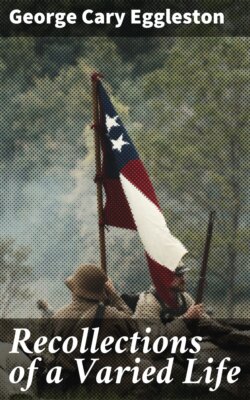Читать книгу Recollections of a Varied Life - George Cary Eggleston - Страница 14
На сайте Литреса книга снята с продажи.
XI
ОглавлениеTable of Contents
Culture by Stealth
After I made up my mind to accept damnation as my appointed portion, I felt myself entirely free to revel at will in the reading that so appealed to my hungry mind; free, that is to say, so far as my own conscience was concerned, but no freer than before so far as the restraints of authority could determine the matter. I had no hesitation in reading the books when I could do so without being caught at it, but to be caught at it was to be punished for it and, worse still, it was to have the books placed beyond my reach, a thing I dreaded far more than mere punishment. Punishment, indeed, seemed to me nothing more than a small advance upon the damnation I must ultimately suffer in any case. The thing to be avoided was discovery, because discovery must lead to the confiscation of my books, the loss of that liberty which my acceptance of damnation had given to me.
To that end I practised many deceits and resorted to many subterfuges. I read late at night when I was supposed to be asleep. I smuggled books out into the woods and hid them there under the friendly roots of trees, so that I might go out and read them when I was supposed to be engaged in a search for ginseng, or in a hunt for the vagrant cow, to whose unpunctuality in returning to be milked I feel that I owe an appreciable part of such culture as I have acquired.
The clerical hostility to literature endured long after the period of which I have been writing, long after the railroad and other means of freer intercourse had redeemed the West from its narrow provincialism. Even in my high school days, when our part of the country had reached that stage of civilization that hangs lace curtains at its windows, wears store clothes of week days, and paints garden fences green instead of white, we who were under Methodist dominance were rigidly forbidden to read fiction or anything that resembled fiction, with certain exceptions. The grown folk of our creed permitted themselves to read the inane novels of the Philadelphia tailor, T. S. Arthur; the few young men who "went to college," were presumed to be immune to the virus of the Greek and Latin fictions they must read there—probably because they never learned enough of Greek or Latin to read them understandingly—and finally there were certain polemic novels that were generally permitted.
Among these last the most conspicuous example I remember was a violently anti-Roman Catholic novel called "Danger in the Dark," which had a vogue that the "best-sellers" of our later time might envy. It was not only permitted to us to read that—it was regarded as our religious duty in order that we might learn to hate the Catholics with increased fervor.
The religious animosities of that period, with their relentless intolerance, their unreason, their matchless malevolence, and their eagerness to believe evil, ought to form an interesting and instructive chapter in some history of civilization in America, whenever a scholar of adequate learning and the gift of interpretation shall undertake that work. But that is a task for some Buckle or Lecky. It does not belong to a volume of random reminiscences such as this is.
